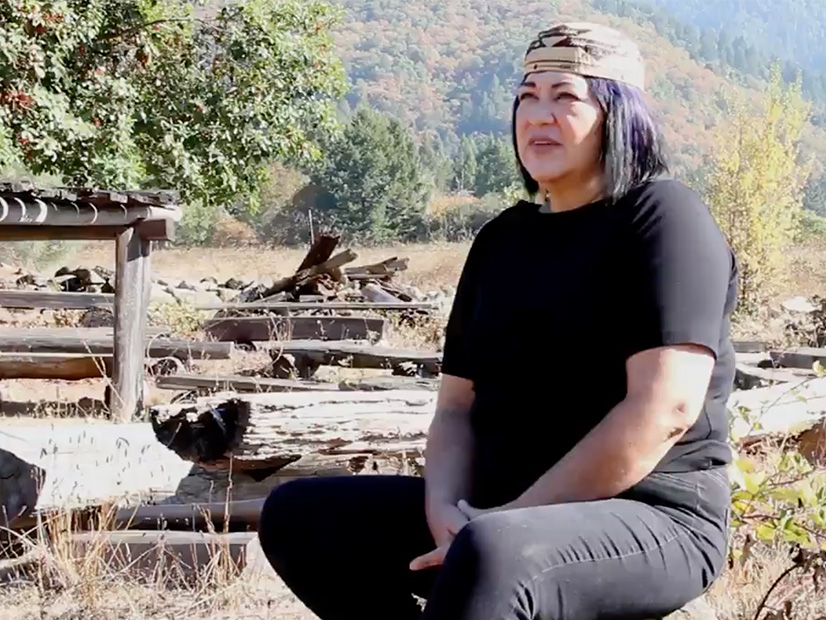
A newly appointed tribal representative to the California Air Resources Board’s environmental justice committee has questioned whether the timeline for the board’s climate change scoping plan gives her enough time to have a meaningful impact.
Jill Sherman-Warne is the first Native American tribal member appointed to CARB’s Environmental Justice Advisory Committee (EJAC).
CARB convened the EJAC in May to make recommendations on the agency’s 2022 scoping plan, a roadmap to achieving the state’s greenhouse gas reduction goals. Other EJAC members were added in August.
Sherman-Warne joins the committee just months before CARB expects to release a draft version of the scoping plan in May. Adoption of a final plan is expected by the end of this year.
“This process is happening so compressed for me that I’m concerned about really having true tribal engagement,” Sherman-Warne said Monday during her first EJAC meeting.
Sherman-Warne is executive director of the Native American Environmental Protection Coalition and an enrolled member of the Hoopa Tribe in Northern California. She referenced the challenge of working with all 109 tribes in California.
“I do want to do everything I can to ensure that they’re engaged, or at least have some knowledge about the process,” Sherman-Warne said during Monday’s meeting. “The timeline’s a big concern for me.”
Extension Denied
The scoping plan timeline is an issue that EJAC members have raised before. It’s possible the topic will be discussed during a joint meeting of the CARB board and the EJAC on March 10.
In October, the EJAC sent a letter to Gov. Gavin Newsom, asking for a six-month extension to the scoping plan schedule to give committee members more time to meaningfully engage with communities they represent. The members represent low-income communities and communities of color that have significant exposure to air pollution.
AB 32, the Global Warming Solutions Act of 2006, requires CARB to update the scoping plan every five years. The last update was in 2017. But the EJAC noted in its letter that the law allows the governor to extend the deadline “in the event of extraordinary circumstances.” (See EJ Committee Seeks Extension on CARB GHG Scoping Plan.)
CARB Chair Liane Randolph responded to the EJAC letter on behalf of Newsom, rejecting the committee’s request for more time.
“Gov. Newsom has charged CARB with completing the plan as quickly as possible, in line with what the climate crisis demands,” Randolph said in a letter to EJAC.
The scoping plan will identify strategies needed to meet GHG-reduction goals, and getting started on those strategies as soon as possible is critical, Randolph said.
And strategy implementation is an area where the EJAC can play a role, she added. Randolph has committed to keeping the EJAC going on a permanent basis, not just during scoping plan development.
“My commitment to continuing active engagement with the EJAC following adoption of the scoping plan presents an important opportunity for the EJAC to advise on the implementation of climate change policy, which is where the benefits intersect with communities,” Randolph wrote.
Concerns Remain
EJAC members have indicated in recent meetings that they’re still not comfortable with the timeline.
“We’ve been working at a breakneck speed to keep up with the pace of the scoping plan and to be able to engage in a meaningful way,” EJAC co-chair Martha Dina Arguello said during a CARB board meeting last month.
Arguello said the issue is two-fold. The timeline makes it difficult for EJAC members to be meaningfully engaged in the scoping plan development, she said, and it leaves little time to gather feedback from impacted communities. Arguello is executive director of Physicians for Social Responsibility — Los Angeles.
Also during the board meeting, EJAC member Kevin Hamilton described the committee’s first community engagement meeting, which took place last month with San Joaquin Valley residents.
Organizers expected about 50 attendees, but the meeting instead drew about 180 participants, overwhelming the Zoom platform, he said. Participants listened until the end of the session and brought many questions and concerns.
“[It] lets me know that if we did this across California, we might hear a very different story than one that we’re hearing at the Capitol,” Hamilton said. “And we need to act and make sure those voices are not only heard, but their concerns acted upon.”
Hamilton is co-director and co-founder of the Central California Asthma Collaborative.
During Monday’s EJAC meeting, Matt Holmes proposed taking the issue directly to the CARB board.
“We need to request that the board vote at the March 10 meeting for an extension of the timeline, if they want to have a fully informed and meaningful EJAC set of recommendations,” Holmes said. He is an environmental justice outreach coordinator for Little Manila Rising and represents the organization in the committee.
Recruitment Challenges
Before Sherman-Warne joined the EJAC, CARB struggled to find a tribal representative for the committee.
The agency’s April 2021 solicitation for EJAC members was sent to a tribal email list, but received no responses from tribal representatives, according to a CARB memo in September.
CARB contacted a member of the legislature for possible referrals and worked with other state agencies on finding a tribal representative. The California Environmental Protection Agency shared the request several times with its Tribal Advisory Committee. EJAC members helped in the search as well.
Tribes contacted directly said they didn’t have time or resources to provide an EJAC representative.
The Strategic Growth Council, a state government committee that works on sustainability and equity issues, also got involved.
One of the council’s recommendations was to explain how the time and effort from the tribal representative would be reflected in the scoping plan update.
“It’s best to ensure that tribes understand the level of integration, especially since tribes are sovereign nations,” SGC said, according to CARB’s memo.
